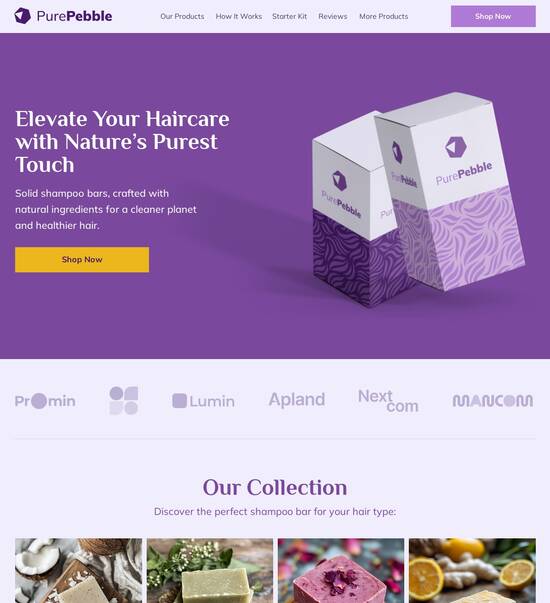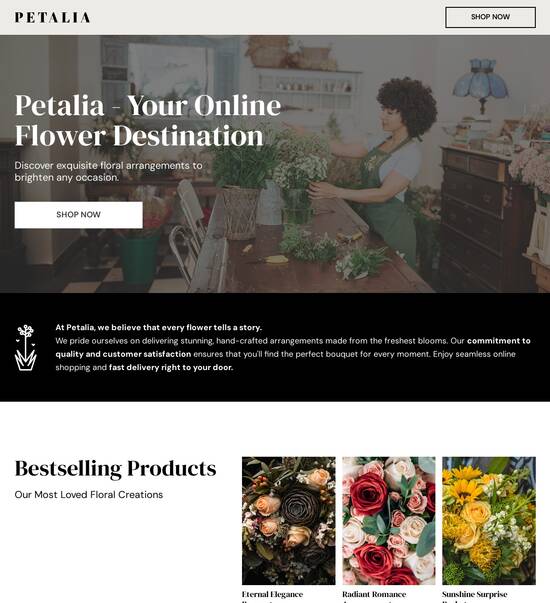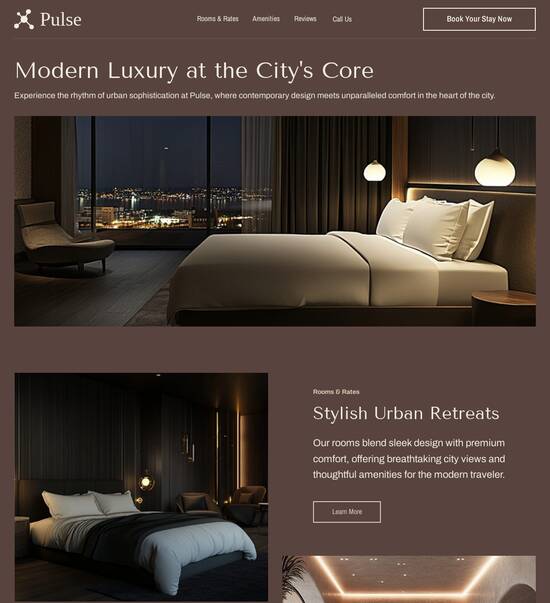
React.js optimized social media platform template
Explore Similar TemplatesAbout template
Leverage our intuitive page builder and high-converting React.js optimized social media platform template.
Recommended templates

Easy to build without coding
With the intuitive drag-and-drop builder, anyone on your team can create high-converting pages without any knowledge of code or design. Make enhancements to your landing page with custom widgets using Javascript, HTML/CSS, or third-party scripts.

Multiple layouts for any industry and goal
Select from 500+ landing page layouts built to boost conversions across industry-specific scenarios. Customize them by adjusting fonts, adding images, and generating on-brand content with the AI assistant. Quickly scale with Instablocks® and Global Blocks that you can save, reuse, and update globally.

Loads fast and looks polished on any device
Every template is responsive, which means they present professionally on any device and load blazingly fast with our Thor Render Engine. You can also power them up with Google AMP technology to deliver an unparalleled mobile experience and drive higher conversions.

Robust analytics & experimentation
Get real-time updates and reporting across all your devices, showing the number of visitors, conversions, cost-per-visitor, and cost-per-lead. Launch AI-powered experiments, run A/B tests, and use heatmaps to analyze user behavior, then optimize your landing page to maximize conversions.







Easy to build without coding
With the intuitive drag-and-drop builder, anyone on your team can create high-converting pages without any knowledge of code or design. Make enhancements to your landing page with custom widgets using Javascript, HTML/CSS, or third-party scripts.
Multiple layouts for any industry and goal
Select from 500+ landing page layouts built to boost conversions across industry-specific scenarios. Customize them by adjusting fonts, adding images, and generating on-brand content with the AI assistant. Quickly scale with Instablocks® and Global Blocks that you can save, reuse, and update globally.
Loads fast and looks polished on any device
Every template is responsive, which means they present professionally on any device and load blazingly fast with our Thor Render Engine.
Robust analytics & experimentation
Get real-time updates and reporting across all your devices, showing the number of visitors, conversions, cost-per-visitor, and cost-per-lead. Launch AI-powered experiments, run A/B tests, and use heatmaps to analyze user behavior, then optimize your landing page to maximize conversions.
All the features you need to build react social media template
Explore more featuresLearn how to build build a social network with react
Frequently asked questions about react social network
Leading the way in building high-performing landing pages





Social media react template: Your ultimate how-to guide
Optimizing your landing pages for maximum conversions is crucial for any marketing strategy targeting business services, tech, education, or financial services. As the leading landing page and CRO platform, Instapage provides a suite of tools designed for marketers looking to elevate their campaigns. This guide will walk you through the steps to create, optimize, and personalize your landing pages using Instapage.
Step 1: Selecting the right template
Choosing the appropriate landing page template is the foundation of your campaign’s success. Instapage offers over 100 ready-to-use, high-converting templates suitable for various industries.
- Choose a template relevant to your campaign: Select layouts designed for specific goals such as lead generation or event registration.
- Customization options: Leverage intuitive builders that allow you to adjust colors, fonts, and images without any coding experience.
- Mobile responsiveness: Ensure that your selected templates are mobile-friendly to cater to users across devices, enhancing user experience and engagement.
Step 2: Implementing optimization strategies
Optimization is key to increasing conversion rates on your landing pages. Instapage provides built-in experimentation features to help you analyze performance and tweak your pages effectively.
- A/B testing: Run A/B tests on different versions of your landing page to determine which elements perform better and make necessary adjustments.
- Heatmap analysis: Utilize heatmaps to understand where users click and engage on your pages, allowing for informed design improvements.
- Performance metrics: Regularly assess page performance through Instapage analytics dashboard to track user interaction and conversion rates.
Step 3: Personalizing user experiences
Personalized content significantly boosts engagement. Use Instapage’s personalization features to target specific audience segments effectively.
- Dynamic text replacement: Alter content dynamically based on the source of the landing page visitor, making messages more relevant.
- Ad mapping: Align targeted ads with custom landing pages to create a seamless experience from click to conversion.
- Audience-level tracking: Employ data tools to monitor how different audience segments interact with your pages and adjust strategies accordingly.
By leveraging these steps, Instapage helps optimize your digital marketing efforts and maximize ROI efficiently. With the right tools and strategies, you can transform your lead generation and improve customer experiences significantly.
Ready to take your marketing campaigns to the next level? Explore how Instapage can streamline your landing page creation and optimization process today!
Overview of a ReactJS optimized social media platform template
The evolution of social media platforms
The development of social media platforms has dramatically changed since the early days of the internet. We can trace a brief timeline, starting from the launch of sites like Six Degrees in the late 1990s to the emergence of giants like Facebook and Twitter in the 2000s. Each phase marked significant advancements in user interaction and content sharing capabilities, evolving from basic profiles to complex communities.
As technology evolved, so did the need for more dynamic applications. Static websites with limited interactivity gave way to web applications that offer real-time updates and engaging user interfaces. ReactJS emerged during this evolution, revolutionizing how developers approach web application development, enabling the creation of highly responsive and interactive user experiences through its innovative component-based architecture.
Six Degrees, the first recognizable social network, launches.
Facebook is founded, changing social networking forever.
Emergence of Instagram, Snapchat, and other platforms focused on media sharing.
ReactJS is introduced by Facebook, streamlining front-end development.
Key features of a ReactJS social media template
A ReactJS social media template offers a host of features that make it an ideal choice for developers looking to create engaging platforms. At its core is the component-based architecture that ReactJS promotes. This paradigm allows developers to build encapsulated components that manage their own state, making it easier to create reusable code snippets. This means profiles, posts, and feeds can be developed as standalone components, which can be reused across various parts of the application, saving both time and effort.
State management is another crucial aspect of ReactJS applications. Tools like Redux and MobX facilitate advanced state management, allowing developers to maintain predictable states across the application, which is particularly important for social media platforms where user interactions continuously affect the data state. Furthermore, performance optimization techniques such as lazy loading and memoization can enhance user experiences by significantly reducing load times and improving responsiveness.
Component-Based Architecture
Reusable components simplify development and enhance UI consistency.
State Management
Redux and MobX help manage state efficiently across multiple components.
Performance Optimization
Lazy loading and memoization improve application speed and responsiveness.
Responsive Design
Ensures usability across devices, including desktops, tablets, and smartphones.
Innovative features tailored for user engagement
Engagement is the lifeblood of social media, and innovative features must be integrated to maintain user interest. Real-time interaction tools like chat systems and notification alerts allow users to connect instantly, which enhances the overall experience. By implementing WebSockets, developers can offer seamless real-time communication, ensuring users stay engaged and connected.
Another vital element is content sharing and integration options. A robust ReactJS template should include social media integration, enabling users to easily share posts across platforms, thus enhancing visibility and interaction. Customizable user feeds also play a significant role in keeping users engaged, as they allow for a tailored content delivery that aligns with individual interests and preferences.
Real-Time Interaction Tools
Chat and notification systems that keep users connected instantly.
Content Sharing
Integration options for seamless sharing across platforms.
User-Centric Design
Customizable profiles and interfaces to enhance personalization.
Community Building Features
Groups, forums, and events that foster interaction and connection.
Integrating travel themes with social media dynamics
In recent years, travel-themed social media platforms have surged in popularity. The intersection of travel and social engagement resonates with a diverse audience eager to share experiences, itineraries, and photos. A travel-focused portfolio website can effectively showcase captivating journeys while integrating social media features that allow users to share and connect around their travels.
When designing a travel-focused template, essential features include travel showcases, customizable itineraries, and photo galleries. Successful implementations of travel-themed social media applications often prioritize user engagement, which further enhances community connections among travel enthusiasts. It is crucial to target different niches of travel enthusiasts, tailoring templates to specific genres such as adventure, luxury, or budget travel.
Travel Showcase
Highlight beautiful destinations and experiences.
Custom Itineraries
Allow users to plan and share their travel plans easily.
Photo Galleries
Encourage users to share their travel photos in an engaging way.
Niche Customization
Adapt features to target specific travel genres.
Utilizing HTML and JS templates for rapid development
For developers looking to expedite the creation of a social media platform, using pre-built HTML and JS templates can be a game-changer. These templates provide an efficient solution, allowing developers to bypass starting from scratch while still benefiting from robust functionalities. The time and cost efficiencies associated with using templates can greatly contribute to project success and speed.
When choosing the right template for a project, it’s vital to consider characteristics that ensure quality and usability. Look for templates that prioritize flexibility and scalability, allowing for easy adjustments and growth as user needs evolve. Comprehensive documentation is equally essential, as it helps developers navigate the template’s features effectively, promoting a smoother development process.
Time Efficiency
Rapid development by using pre-designed templates.
Cost-Effectiveness
Reduces overall development costs significantly.
Enhanced Functionality
Pre-built features increase application robustness from the start.
Quality Characteristics
Ensure flexibility, scalability, and strong documentation.
The role of portfolios in social media platforms
A portfolio website is a vital aspect of individual identity on social media platforms. Users can showcase their work, promote their skills, and share their achievements in a visually appealing manner. Strong portfolios highlight projects through organized layouts, enhance credibility with testimonials, and make effective use of engaging content that draws attention.
Integrating social features into portfolio websites further enhances user interaction and community building. This includes options allowing readers to connect, like, and share portfolio entries with others, providing invaluable exposure. Personal branding is significant in the social era, making it essential to design portfolios that reflect authenticity and encourage engagement among peers and audiences.
Visually Appealing Layouts
Attract visitors and showcase work effectively.
Use of Testimonials
Build credibility and trust through user endorsements.
Social Features Integration
Enable sharing and connecting with others in the community.
Fostering Personal Branding
Reflect authentic self and engage effectively with the audience.
Future trends in ReactJS social media development
The future of ReactJS and social media development is ripe with opportunity. Emerging technologies, such as artificial intelligence and machine learning, are transforming how content is delivered and personalized across platforms. Enhanced algorithms can offer tailored experiences based on user behavior, preferences, and interactions, fostering deeper engagement within social media communities.
Moreover, the rise of augmented reality (AR) is paving the way for immersive engagement. As users seek interactive experiences, AR can bridge the gap between the digital and physical worlds, enabling unique content interactions. Anticipating user expectations will also be critical, with a growing emphasis on privacy, security, and decentralized platforms to enhance overall user trust.
AI and Machine Learning
Transform content delivery for personalized user experiences.
Augmented Reality
Enhance engagement and interaction with innovative experiences.
User Privacy and Security
Increasing user demands for secure and anonymous interactions.
Decentralized Platforms
Emergence of platforms that prioritize user control and data ownership.
Real-world applications and case studies
Analyzing real-world applications provides valuable insights into the successful implementation of ReactJS social media templates. One prominent example is a travel-focused social media platform that allows users to connect over shared experiences. By leveraging the powerful features of ReactJS, this platform has created engaging user experiences, including interactive maps and personalized feeds.
Lessons learned from these case studies emphasize the importance of user feedback in the design process. Continuous user testing helps identify pain points, fostering iterative design that enhances overall user experience and satisfaction. Platforms that prioritize user input are better positioned to adapt and grow within an ever-changing social media landscape.
Case Study Example
Successful implementation of a travel-focused platform utilizing ReactJS.
User Testing
Crucial for identifying areas of improvement and adapting features.
Iterative Design
Enhanced experiences based on continuous user feedback.
Adapting to Change
Flexibility in design ensures resilience in the evolving landscape.
Conclusion of capabilities and benefits
In conclusion, a ReactJS optimized social media platform template serves as a robust foundation for building engaging, user-friendly applications. The blend of innovative features, component-based architecture, and efficient state management positions developers for success in a competitive landscape. Tailoring the template to user preferences and needs fosters deeper engagement and satisfaction.
Looking ahead, the continuous evolution of web technologies will create further opportunities for innovation within social media platforms. As developers harness these capabilities, they can drive engagement and build vibrant communities that thrive on interaction and connectivity. A thoughtfully designed ReactJS template can pave the way for future advancements in social media development.
Engaging User Experiences
Empower communities through robust and tailored applications.
Innovative Features
Boost user satisfaction through cutting-edge technologies.
Community Building
Foster interaction and connection among users.
Future Opportunities
Advancements in technology offer unlimited potential for platforms.
Ready to skyrocket conversions?
Supercharge your ad campaigns with high-performing landing pages
Get started














